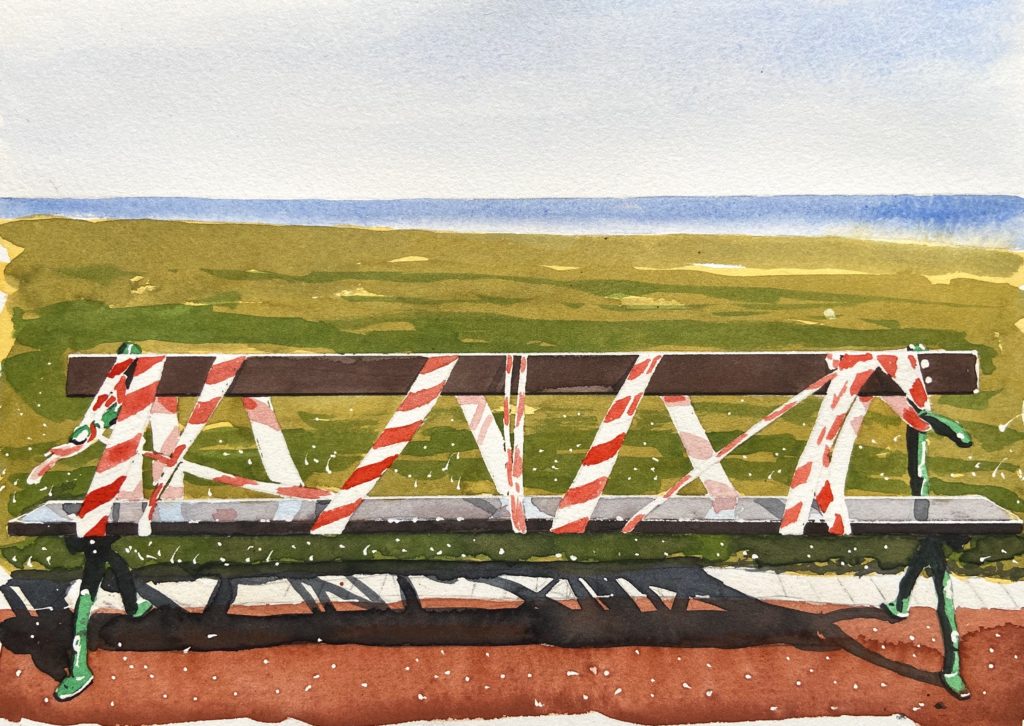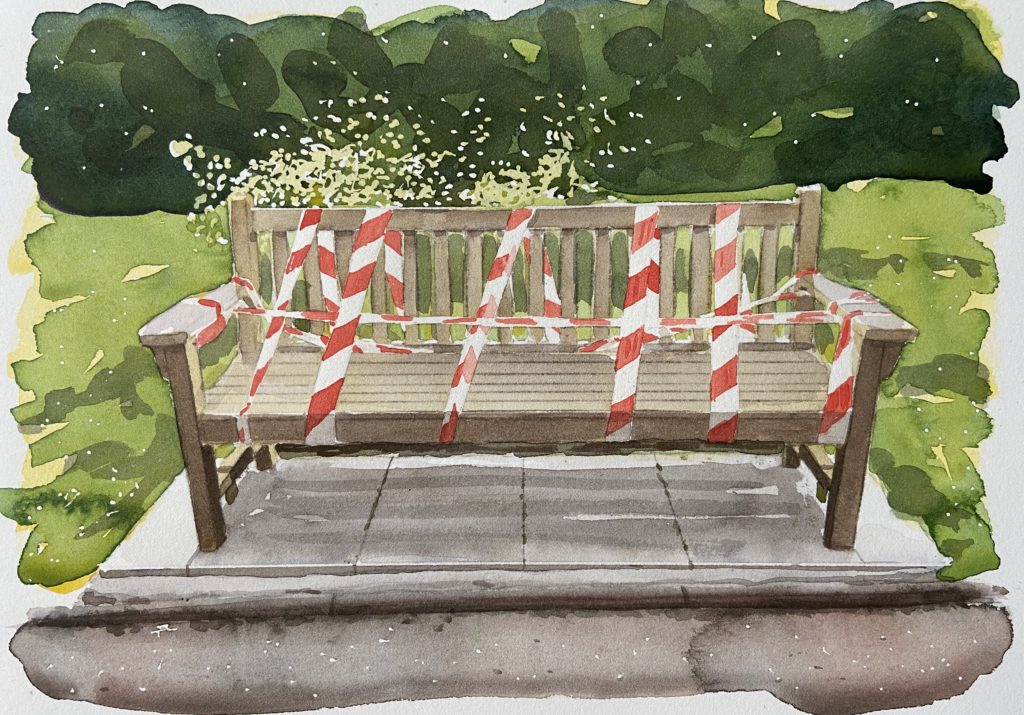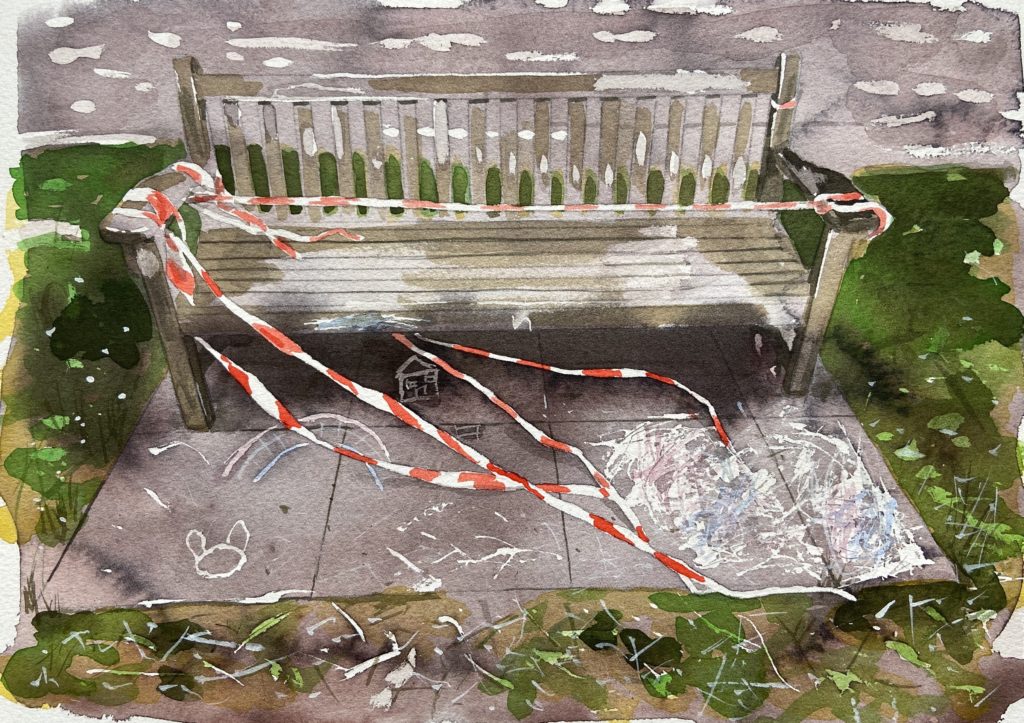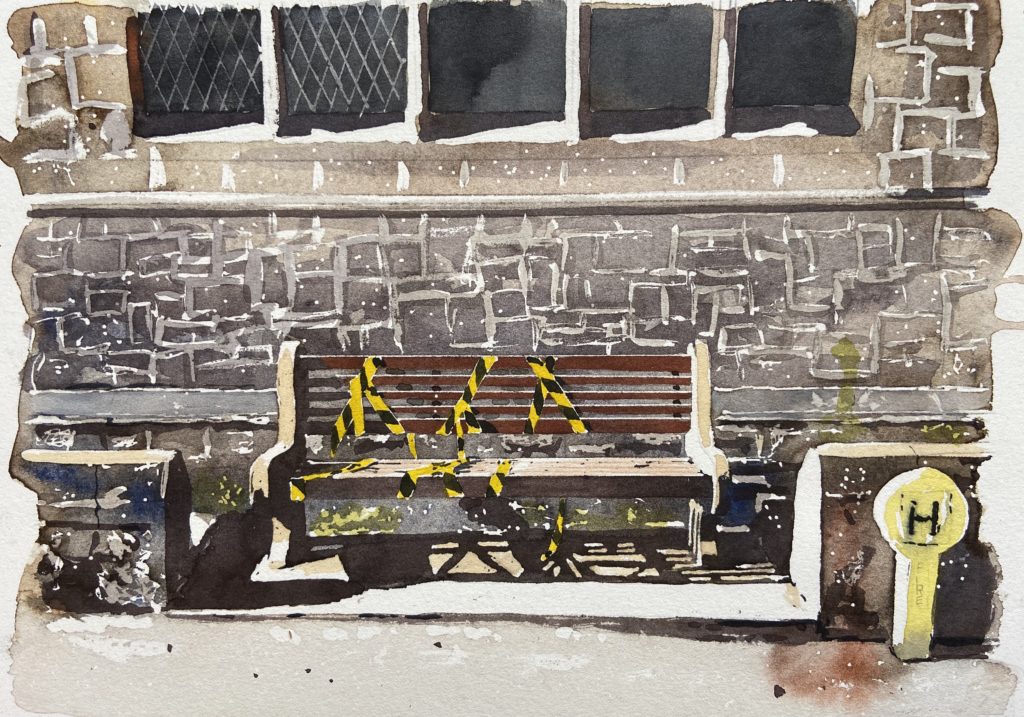Michael Smith introduces the hazard-taped lockdown paintings of Narbi Price.

The strange limbo of lockdown began melting away like a Mr Whippy in the summer heat. It was time to venture out into the world again, baby steps at first, and following Mr Cummings’ example, we left town and the comfort of our home for the first time in months, deciding on a family day out to our own little Barnard Castle – Rye, a pretty medieval walled town with a church on a hill that is just up the road from where we live. I kept catching glimpses of the post-Covid world that was starting to emerge, a strange and sometimes pathetic combination of the dystopian and the absurd.
We visited an olde worlde sweet shoppe we like. The bloke had had a stable door fitted, closed on the bottom half, a counter over the top with an electronic card reader on it. He stood there, as squashed into the far back corner of the shop as he could get, surrounded by his jars of humbugs and chocolate limes, with one of those weird visors on. You tapped the card machine for your £1.60’s worth of nostalgic sweets at the threshold, and he passed you your paper bag full through the stable door from the back of the shop via a fishing net on the end of a very long pole. “You can never be too careful,” I joked. He didn’t see the funny side, just looked on stony faced.
After our joyless confectionary transaction we wandered round the deserted tourist trap. We lingered as always by the Franciscan monastery and the old parish churchyard with the lovely sense of peace that hangs diaphonously in the air like an antique perfume there, the church tower with the bells and the golden baroque cherubs and the quote from King Solomon, “For our time is a very shadow that passeth away” by the sundial, from an age when people had to live with plagues as a matter of course, and were all too keenly aware of their own transience and mortality … we headed down the cobbled Hovis Hill to the Most Haunted Pub in England; we heard feet walking across the Tudor beams of the ceiling and my son was convinced it was said phantoms; I didn’t have the heart to tell him it was probably just staff walking about upstairs, trying to fill up the time and look busy in the all-but deserted inn, the shadows of the living rather than the dead, while we sat at one of the two occupied tables, and the waitress took our order (no bar service) in another of those weird visors …
The bairn had been in a stroppy mood all day and we only kept him marching on with the promise of a go on the playground next to the carpark where we parked. When we finally got there after much huffing and sulking up and down winding cobbled streets, his little face dropped to see the gates had been locked by order of Rye Council because of Covid-19. The panic was mounting in his mam’s eyes, like this was the inevitable end of a doomed day. Seeing an imminent crisis, I took evasive action. Fuck this, I thought, if Dominic Cummings can drive all the way from Islington to Barnard Castle in the middle of a lockdown, we can have a go on them swings. “Come here son, we’re breaking the law,” I told him as I lifted him over the fence into the playground. He was elated by this surprise turn of events, and climbing up the pirate ropes to have a go on the slide was suddenly spiced up with the thrill of the illicit, a five year old’s version of an illegal rave, a thrill only heightened by the fact we were in full view of all the cars going up and down the main road in and out of town, and maybe even the bobbies. We kept singing ‘Breaking the Law’ like Beavis & Butt-Head as he went higher & higher on the swing. “What if the police come and tell you off?” asked his mother from the other side of the fence, “I’ll just put my fingers in my ears and repeat “Banrnard Castle, Barnard Castle, Barnard Castle,” I told her as she went off to hide in the car. After ten or fifteen minutes I even had the cast-iron excuse we had to get out of there sharpish, “Before the Bobbies come and get us” – he bought it, and we scarpered off like Butch Cassidy and the Sundance Kid. All the way home he was looking out of the back window excitedly, saying, “Quick! I think I can see the rozzers!”
This was our first experience of participating in public space again, a space that had all but evaporated as we atomised during lockdown. Going on the swings had become a trivially criminal act.

The places we used to share taped up like a crime scene: Narbi’s bench pictures sum up the situation beautifully. There’s something sad and mournful about them. These benches are often memorials. I’ve always found them touching, intimate, human, something generous, empathic, and in their own small way, noble, as if they’re saying something like: “In the smallness of our lives, these very shadows, this little spot brought me joy, I found meaning here, and maybe even a kind of grace; and even though I’m gone now, I want to share that joy and that meaning and that grace with you, so this at least lives on.”
There’s a double sadness to these benches in Narbi’s paintings, they become a double memorial – one personal, to someone’s small individual life, and one general, to the bigger life we all share, and to the hope we can help each other and raise each other up in the participating of it. Narbi’s lockdown pictures seem to me to be mourning the loss of this shared life during that strange spring and early summer where we saw it reduced to people bickering on facebook, a pizza delivery your umbilical cord to the bigger human world, walking your dog round a deserted park and all the poo bags left on top of the dog shit bin because people were too afraid to lift open the hatch. The places where we all shared the small joys marked off in crime scene tape, as if that shared life itself were now the crime.

I’m glad I can now sit on benches again. Me and the bairn have started going to visit his granma again (a walk in the park is as far as we take it for now), and afterwards I pop into M&S and she waits outside on a bench baring the memorial
PAM
BORN TO SHOP
which brings me a smile, and the thought Pam was probably a good laugh.
A mate of mine, the writer Gareth Rees, is fond of going up the hill and staring down at the Old Town from a bench that bares the legend
MAD JOHN ?
1945 – 2009..
But was he? He wonders, sitting on John’s spot and staring out across the panorama of Hastings’ old fishing village opening out to the sea … “John’s uncertain madness heralded the spirit of the decade that was to follow his death,” he mused when I asked him to remind me what exactly the inscription said again for this essay.
What uncertain madness Covid-19 will evoke for the coming decade, who knows. All I know is its first year, 2020, was a time of CSI’d memorial benches and blokes in visors passing you quarantined brexit sweets on the end of very long fishing poles. A year our time seemed very shadows indeed.

*
Narbi Price is a painter. He was the winner of the Contemporary British Painting Prize 2017, was the Journal Culture Awards Visual Artist of the Year 2018, and was a prizewinner in the John Moores Painting Prize 2012. He also featured in Phaidon’s ‘Vitamin P3 – New Perspectives in Painting.’ You can order the book of Narbi’s Lockdown Paintings, and check out his work here.